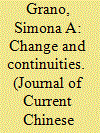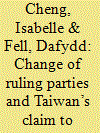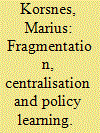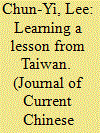|
|
|
Sort Order |
|
|
|
Items / Page
|
|
|
|
|
|
|
| Srl | Item |
| 1 |
ID:
134308


|
|
|
|
|
| Summary/Abstract |
The student-led anti–media-monopoly movement in Taiwan has generated strong momentum since mid-2012. In early 2013, the National Communications Commission responded by drafting the “Prevention of Broadcasting and Television Monopoly and the Maintenance of Diversity Act”, which was approved by the Executive Yuan in April 2013 and is now waiting to be debated in the Legislative Yuan. In contemporary Taiwan, the social is often connected with the political. The existing democratic system, which is a legacy of the democratisation process in the twentieth century, no longer seems adequate to serve the citizens of the twenty-first century. This paper considers the anti-media-monopoly movement and the burgeoning civic movements in recent years as part of a “second wave” of democratisation for further political reform and democratic consolidation. When martial law was lifted in Taiwan in 1987, the “first wave” of media liberalisation ended with the commercialisation of industry. The “second wave” of media democratisation has picked up where the first wave left off and may finally establish, through increasingly more thoughtful media policies, a better and fairer media environment that is more suitable for democratic Taiwan.
|
|
|
|
|
|
|
|
|
|
|
|
|
|
|
|
| 2 |
ID:
134309


|
|
|
|
|
| Summary/Abstract |
In representative governments, a healthy turnover of power among ruling parties is viewed as a critical sign of democratic principles. In a political environment where voters’ opinion is the key political driver, the greatest challenge facing the NGO community is often that environmental concerns only represent secondary aspects of the policy-making process. This article focuses on the transformations (or lack thereof) in Taiwan’s environmental governance, under different political parties, particularly during the past few years. I begin with an overview of the key issues that have characterised Taiwan’s environmental movement and its battles, starting with the democratic transition of the mid-1980s, before focusing on two developmental projects – Taiwan’s eighth petrochemical plant and fourth nuclear power facility – to bring to light the most significant changes and continuities in the environmental-policy realm. I pay special attention to the post-2008 period and the ensuing renaissance experienced by the environmental movement, among others. The final section considers the consequences of the KMT’s second elect-oral victory – in January 2012 – for environmental policies and, in light of the article’s findings, summarises what has changed and what has consistently remained the same under different ruling parties.
|
|
|
|
|
|
|
|
|
|
|
|
|
|
|
|
| 3 |
ID:
134307


|
|
|
|
|
| Summary/Abstract |
In recent years, female marriage migration from China and Southeast Asia has significantly increased the number of foreign-born citizens in Taiwan. This article is a preliminary investigation into how political parties responded to the growing multicultural makeup of the national community between 2000 and 2012. We examine the content of the Understanding Taiwan textbook, the election publicity of the two major political parties, citizenship legislation, and the results of interviewing immigrant women. The findings show that the change in the ruling party did make differences in terms of both parties’ projection of immigrant women in election propaganda and citizenship legislation. However, inward-looking multiculturalism is practised by the two main political parties in Taiwan to forge national identity and enhance national cohesion rather than to promote the recognition of immigrants’ different cultural heritage.
|
|
|
|
|
|
|
|
|
|
|
|
|
|
|
|
| 4 |
ID:
134315


|
|
|
|
|
| Summary/Abstract |
The alleged death of British multiculturalism has been celebrated in some quarters and regretted in others. Invoking Ulrich Beck’s discussion of zombie categories, we argue that while the appeal of ‘multiculturalism’ as a term has clearly declined, the category in Britain that it refers to encompasses not a single charter, but a series of political settlements and public policies that remain in place even though they have been joined (and frequently challenged) by others. Distinguishing between the term and the category is a valuable means of assessing the persistence of multiculturalism as a mode of integration in Britain.
|
|
|
|
|
|
|
|
|
|
|
|
|
|
|
|
| 5 |
ID:
134311


|
|
|
|
|
| Summary/Abstract |
This paper seeks to understand what government mechanisms have allowed China’s wind industry to grow as fast as it has over the past ten years. Instead of formal rules and regulations, this paper focuses on specific sets of institutional conditions that have been crucial in the process of high-speed implementation of wind energy in China. Specifically, fragmentation and centralisation, together with policy experimentation and policy learning, have been fundamental for policy flexibility and institutional adaptability. The paper illustrates that there are benefits and disadvantages to these characteristics, and that inherent qualities of China’s governing system that lead to rapid growth overlap with those that lead to challenges in terms of quality and long-term performance.
|
|
|
|
|
|
|
|
|
|
|
|
|
|
|
|
| 6 |
ID:
134306


|
|
|
|
|
| Summary/Abstract |
This paper argues that the comparison of labour policies in Taiwan and China has an important bearing on the interaction between state and society. The fact that labour policies have changed over time illustrates a process of bargaining between the state and society. The core question of this paper is whether the development of labour policies in Taiwan can provide China a good example to learn from. In order to answer this question more systematically, the first part of this paper provides theoretical reviews of the state–society relationship, while the second part aims to verify whether those labour-favouring policies in Taiwan have changed under a different party’s governance. The third part of the paper further investigates labour policy in China; this section mainly focuses on the historical background to the new labour contract law. Based on the preceding two sections’ literature review of the changing path of labour policies, the fourth section scrutinises fundamental issues reflected in the development of Taiwan’s labour policies, then compares how those issues are reflected in the case of China. The conclusion of this paper is that although Taiwan, like China, formerly had a one-party system, the changes in Taiwan’s labour policies are not completely comparable to China, though both societies had some similarities.
|
|
|
|
|
|
|
|
|
|
|
|
|
|
|
|
| 7 |
ID:
134297


|
|
|
|
|
| Summary/Abstract |
In early 2011, the Kuomintang (KMT, Guomindang) government appeared to be in danger of losing power in the upcoming presidential elections. The DPP had recovered sufficiently from its disastrous electoral performance in 2008 to pose a real challenge to Ma Ying-jeou (Ma Yingjiu) and had matched the KMT’s vote share in mid-term local elections. Ma also faced the challenge of an independent presidential candidate, James Soong (Song Chuyu), who had come a close second in 2000 and now threatened to divide the pro KMT vote. Nevertheless, the KMT was able to win reduced majorities in both the presidential and legislative elections in January 2012. This article seeks to explain how the KMT was able to hold on to power by comparing the campaign with earlier national-level elections. We are interested in identifying the degree to which the Democratic Progressive Party (DPP, Minjindang) learnt from its electoral setbacks in 2008 and whether the KMT employed a similar campaign strategy to the one that had been so effective in returning it to power in 2008. Our analysis relies of an examination of campaign propaganda and campaign strategies as well as participant observation and survey data from 2012 and earlier contests.
|
|
|
|
|
|
|
|
|
|
|
|
|
|
|
|
| 8 |
ID:
134310


|
|
|
|
|
| Summary/Abstract |
This paper analyses how Taiwan exercises “soft power” and uses public diplomacy to engage with the international community, and to compensate for the absence of formal diplomatic relations with major powers. The research suggests that Taiwan’s strategies of international engagement are constrained by its external and internal political environments. The international system (structure) has locked Taiwan into a set of challenging arrangements over which it has little control or influence, while Taiwan’s public diplomacy architecture and the activities organised and undertaken by its government agencies in Taibei and its representatives abroad (agency) reveal, at best, a misunderstanding of how Taiwan’s soft power might be exercised more effectively. The strategic thematic choices of legitimacy (invoking Taiwan’s international status) versus credibility (which in soft power terms offers the most benefit), and the decision to privilege cultural over political themes in international communications, all have profound effects on the success of Taiwan’s soft power.
|
|
|
|
|
|
|
|
|
|
|
|
|
|
|
|
|
|
|
|
|